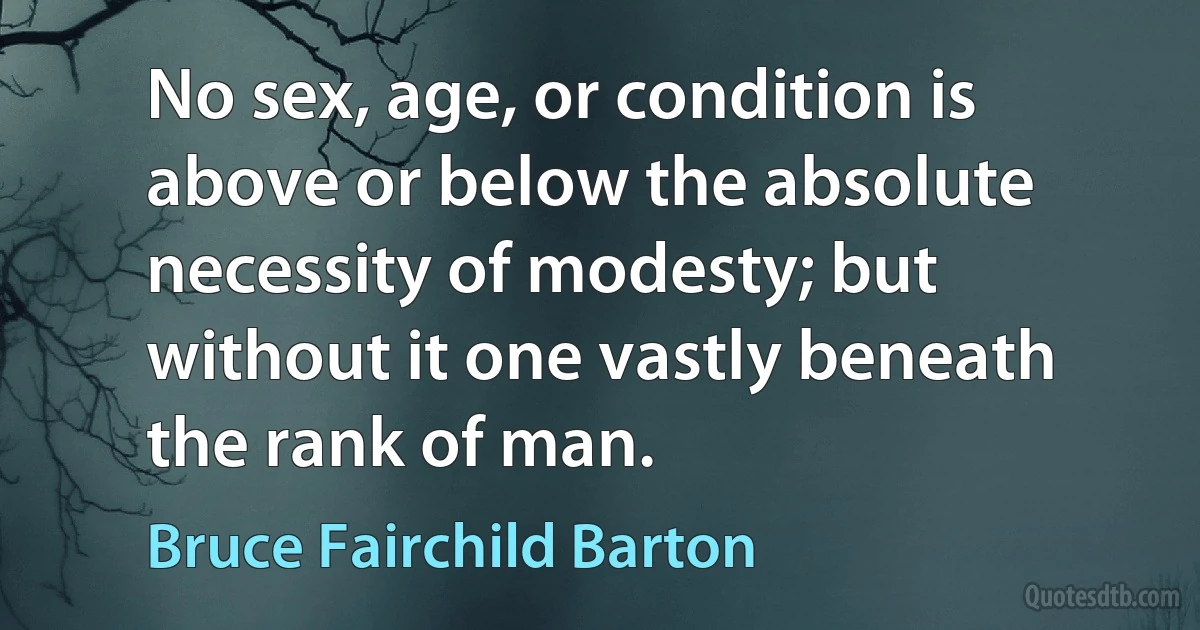Condition Quotes - page 30
Without these experimental tests, very few physicists would have accepted general relativity. There are many hypotheses in physics of almost comparable brilliance and elegance that have been rejected because they did not survive such a confrontation with experiment. In my view, the human condition would be greatly improved if such confrontations and willingness to reject hypotheses were a regular part of our social, political, economic, religious and cultural lives.

Carl Sagan
There is no such thing as pointless violence. City of God, is that pointless violence? It's reality, it's real life, it has to do with the human condition. Being involved in Christianity and Catholicism when I was very young, you have that innocence, the teachings of Christ. Deep down you want to think that people are really good - but the reality outweighs that.

Martin Scorsese
When I behold this I sighed, and said within myself, "Surely mortal man is a broomstick!" Nature sent him into the world strong and lusty, in a thriving condition, wearing his own hair on his head, the proper branches of this reasoning vegetable, till the axe of intemperance has lopped off his green boughs, and left him a withered trunk; he then flies to art, and puts on a periwig, valuing himself upon an unnatural bundle of hairs, all covered with powder, that never grew on his head; but now should this our broomstick pretend to enter the scene, proud of those birchen spoils it never bore, and all covered with dust, through the sweepings of the finest lady's chamber, we should be apt to ridicule and despise its vanity. Partial judges that we are of our own excellencies, and other men's defaults!

Jonathan Swift
For my own part, I may desire in general to be other than I am; I may condemn and dislike my whole form, and beg of Almighty God for an entire reformation, and that He will please to pardon my natural infirmity: but I ought not to call this repentance, methinks, no more than the being dissatisfied that I am not an angel or Cato. My actions are regular, and conformable to what I am and to my condition; I can do no better; and repentance does not properly touch things that are not in our power; sorrow does.. I imagine an infinite number of natures more elevated and regular than mine; and yet I do not for all that improve my faculties, no more than my arm or will grow more strong and vigorous for conceiving those of another to be so.

Michel de Montaigne
In this present that God has made us, there is nothing unworthy our care; we stand accountable for it even to a hair; and is it not a commission to man, to conduct man according to his condition; 'tis express, plain, and the very principal one, and the Creator has seriously and strictly prescribed it to us. Authority has power only to work in regard to matters of common judgment, and is of more weight in a foreign language; therefore let us again charge at it in this place.

Michel de Montaigne
We ought to regard the interests of the state as of far greater moment than all else, in order that they may be administered well; and we ought not to engage in eager rivalry in despite of equity, nor arrogate to ourselves any power contrary to the common welfare. For a state well administered is our greatest safeguard. In this all is summed up: When the state is in a healthy condition all things prosper; when it is corrupt, all things go to ruin.

Democritus
I will have achieved my aim if, by the end of this book, you demand that people produce good reasons for what they believe-not only in religion, but in any area in which evidence can be brought to bear. I'll have achieved my aim when people devote as much effort to choosing a system of belief as they do to choosing their doctor. I'll have achieved my aim If the public stops awarding special authority about the universe and the human condition to preachers, imams, and clerics simply because they are religious figures. And above all, I'll have achieved my aim if, when you hear someone described as a "person of faith,” you see it as criticism rather than praise.

Jerry Coyne
The hearer of myth, regardless of his level of culture, when he is listening to a myth, forgets, as it were, his particular situation and is projected into another world, into another universe which is no longer his poor little universe of every day.... The myths are true because they are sacred, because they tell him about sacred beings and events. Consequently, in reciting or listening to a myth, one resumes contact with the sacred and with reality, and in so doing one transcends the profane condition, the "historical situation." In other words one goes beyond the temporal condition and the dull self-sufficiency which is the lot of every human being simply because every human being is "ignorant" - in the sense that he is identifying himself, and Reality, with his own particular situation. And ignorance is, first of all, this false identification of Reality with what each one of us appears to be or to possess.

Mircea Eliade
The framers of the Constitution well understood that each locality, having separate and distinct interests, required separate and distinct laws, domestic institutions, and police regulations adapted to its own wants and its own condition; and they acted on the presumption, also, that these laws and institutions would be as diversified and as dissimilar as the States would be numerous, and that no two would be precisely alike, because the interests of no two would be precisely the same.

Stephen Douglas
Virtue is infinitely various. There is no situation in which a rational being is placed, from that of the best instructed Christian down to the condition of the rudest barbarian, which affords not room for moral agency; for the acquisition, exercise, and display of voluntary qualities, good and bad. Health and sickness, enjoyment and suffering, riches and poverty, knowledge and ignorance, power and subjection, liberty and bondage, civilisation and barbarity, have all their offices and duties, all serve for the formation of character: for when we speak of a state of trial, it must be remembered, that characters are not only tried, or proved, or detected, but that they are generated also, and formed, by circumstances. The best dispositions may subsist under the most depressed, the most afflicted fortunes.

William Paley
Being able to live to the age of 76 was already a great blessing, but in my physical condition, I could not conceive how I would be able to serve time in prison until I became 81. I thought of John the Baptist 2000 years ago. He came with the mission to bear witness about Jesus but ended up dying in prison. I, Bo Hi, have lived with the conviction that I was born with the mission of John the Baptist for the time of the Second Advent. If it was my mission and destiny to die in prison in order to indemnify the failure of the first John the Baptist, then I was resolutely determined to solemnly receive my fate.

Bo Hi Pak
Hayek's theory of evolutionary rationality shows how traditions and customs (those surrounding sexual relations, for example) might be reasonable solutions to complex social problems, even when, and especially when, no clear rational grounds can be provided to the individual for obeying them. These customs have been selected by the ‘‘invisible hand'' of social reproduction, and societies that reject them will soon enter the condition of ‘‘maladaptation,'' which is the normal prelude to extinction.

Roger Scruton

![In fact we do not know anything infallibly, but only that which changes according to the condition of our body and of the [influences] that reach and impinge upon it. (Democritus)](https://cdn.quotesdtb.com/img/quotes_images_webp/53/democritus-anything-body-condition-279453.webp)

